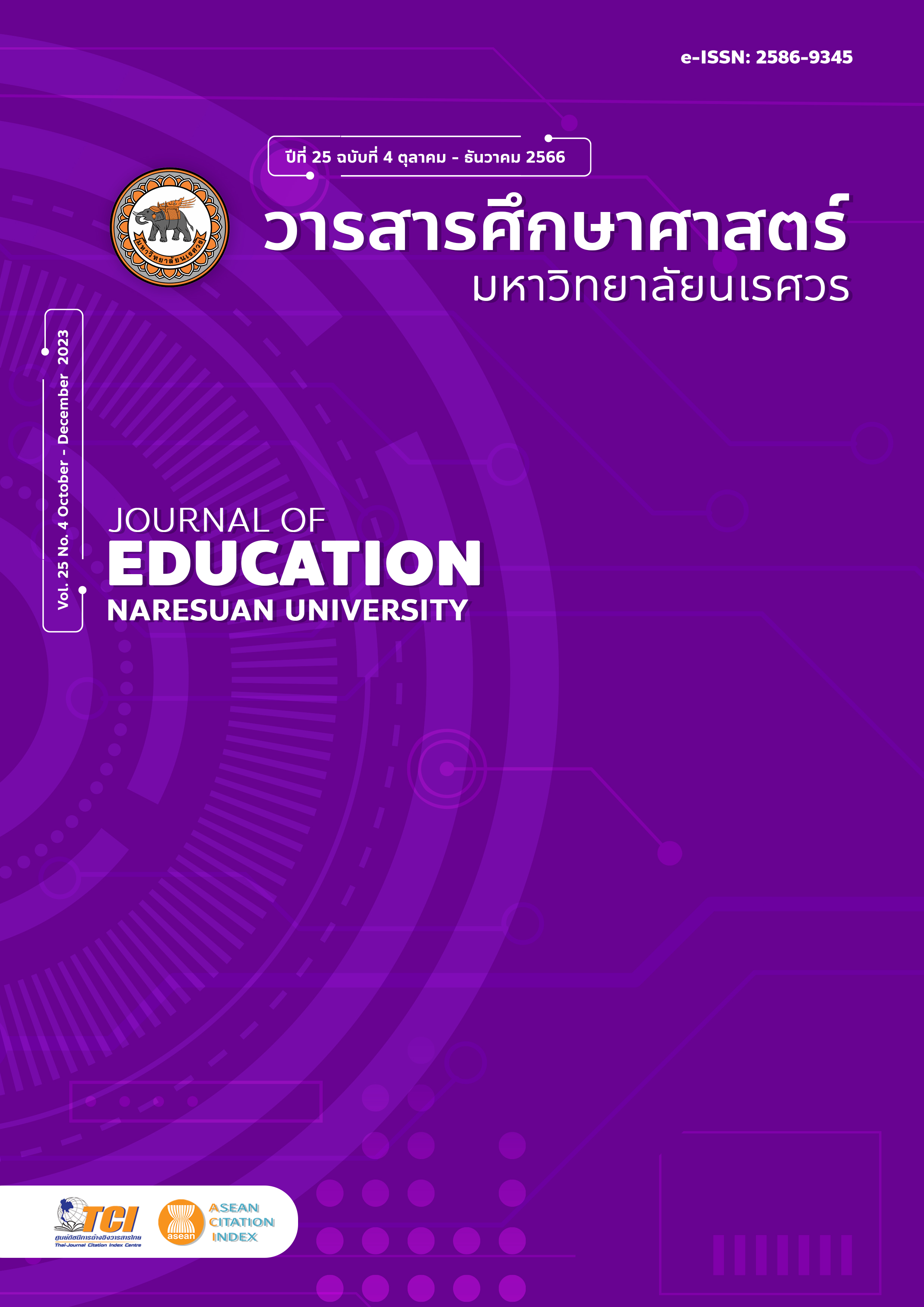EFFECTS OF WEBQUEST AND QAR STRATEGY ON READING LITERACY OF LOWER SECONDARY SCHOOL STUDENTS
Main Article Content
Abstract
The research is aimed 1) to compare the reading literacy of the students before and after the lesson using WebQuest and QAR strategy and 2) to compare the reading literacy in each element both before and after the lesson using WebQuest and QAR strategy. Thirty – two participants were recruited from grade 8th students in a large – scale public school in Ratchaburi province using cluster random sampling. The research instruments are lesson plan using WebQuest and QAR strategy, comprehensive test, reading engagement test, and reading engagement record. Mean, Standard Deviation, and Quasi-experimental research were employed to analyze the data. T–test independent was used to compare the pre-test and post-test score. The findings reveal that 1) the participants have gained more the average score of reading literacy after the WebQuest and QAR lesson at the 0.1 significant level, and 2) the participants have gained more average score for each element of reading literacy at the 0.5 significant level.
Article Details

This work is licensed under a Creative Commons Attribution-NonCommercial-NoDerivatives 4.0 International License.
The owner of the article does not copy or violate any of its copyright. If any copyright infringement occurs or prosecution, in any case, the Editorial Board is not involved in all the rights to the owner of the article to be performed.
References
Cambria, J., & Guthrie, J. T. (2010). Motivating and engaging students in reading. The NERA Journal, 46(1), 16-29.
Chaimin, C., & Yuangsoi, P. (2019). Reading promotion in digital age schools. Journal of Education Naresuan University, 21(3), 356-367. [in Thai]
Chhouk, C. (2017). Development of an instructional model integrating WebQuest learning approach and reflective practice to enhance english critical reading Ability of undergraduate students in Cambodia. (Doctor thesis). Bangkok: Chulalongkorn University.
Dodge, B. (2001). Focus: Five rules for writing a great WebQuest. Learning and Leading with Technology, 28, 6-9.
Fletcher, J. (2014). A review of “effective” Reading Literacy practices for young adolescent 11 to 13 year old students. Educational Review, 66(3), 293-310.
Gürgil, F., Ünal, M., & Aksoy, B. (2019). Social studies preservice teachers’ views on and experiences with WebQuest. Journal of Education and Training Studies, 7(4), 131-141.
Halat, E. (2008). A good teaching technique: WebQuests. The Clearing House: A Journal of Educational Strategies, Issues and Ideas, 81(3), 109-112.
Intharaksa, P. (2019). Learning management with social media. Journal of Education Naresuan University, 21(4), 357-365. [in Thai]
Khammani, T. (2017). Science of Teaching Pedagogy: knowledge for organizing effective (21st ed.). Bangkok: Chulalongkorn University Printing. [in Thai]
Khunrit, B. (2019). Learning management models and techniques for developing reading skills towards transformative learning. Journal of Education, Prince of Songkla University, Pattani Campus, 30(2), 1-16. [in Thai]
March, T. (2007). Revisiting WebQuests in a web 2 world. How developments in technology and pedagogy combine to scaffold personal learning. Interactive Educational Multimedia, 15, 1-17.
Mullis, I. V. S., & Martin, M. O. (2019). PIRLS 2021 assessment framework. United States: TIMSS & PIRLS International Study Center.
NAEP. (2019). Reading framework for the 2019 National Assessment of Educational Progress. Washington, DC: NAEP.
National Institute of Educational Testing Service. (2019). The Result of the Ordinary National Education Test (O-NET), Mathayom 3, Academic Year 2018. Retrieved May 5, 2020, from http://www.newonetresult.niets.or.th/AnnouncementWeb/PDF/SummaryONETM3_2561.pdf [in Thai]
National Institute of Educational Testing Service. (2020). The Result of the Ordinary National Education Test (O-NET), Mathayom 3, Academic Year 2019. Retrieved May 5, 2020, from http://www.newonetresult.niets.or.th/AnnouncementWeb/PDF/SummaryONETM3_2562.pdf [in Thai]
Nurhayati, Muslem, A., & Manan, A. (2019). QAR strategy for effective teaching of reading comprehension. English Education Journal: Jurnal Pengembangan Pendidikan Dan Pengembangan Pengajaran Bahasa, 10(1), 95-111.
Nusawat, N. (2017). Issues raising: How can reading literacy development be achieved? Journal of Education Studies, Chulalongkorn University, 45(3), 252-263. [in Thai]
OECD. (2019). PISA 2018 results (volume I): What students know and can do. Paris: PISA, OECD Publishing.
Pasiphol, S. (2016). Learning measurement and evaluation. Bangkok: Chulalongkorn University Printing House. [in Thai]
Raphael, T. E., & Au, K. H. (2005). QAR: Enhancing comprehension and test taking across grades and content areas. International Reading Association, 59(3), 206-221.
Siagian, A. R. (2020). The effect of using Question and Answer Relationship (QAR) strategy on reading comprehension. LINGUISTIK: Jurnal Bahasa and Sastra, 5(1), 159-169.
Sriwattanametakul, J. (2015). A study of guidelines for promoting reading literacy activities of Thai lower secondary school teachers in Bangkok (Master thesis). Bangkok: Chulalongkorn University. [in Thai]
Varatorn, S. (2007). Suggest Thai Kids to be Bookworms (2). Bangkok: Thailand Knowledge Park. [in Thai]
Widyarini, F. (2018). Using WebQuest to improve students’ reading comprehension. International Journal of Scientific Engineering and Research, 6(10), 21-25.


